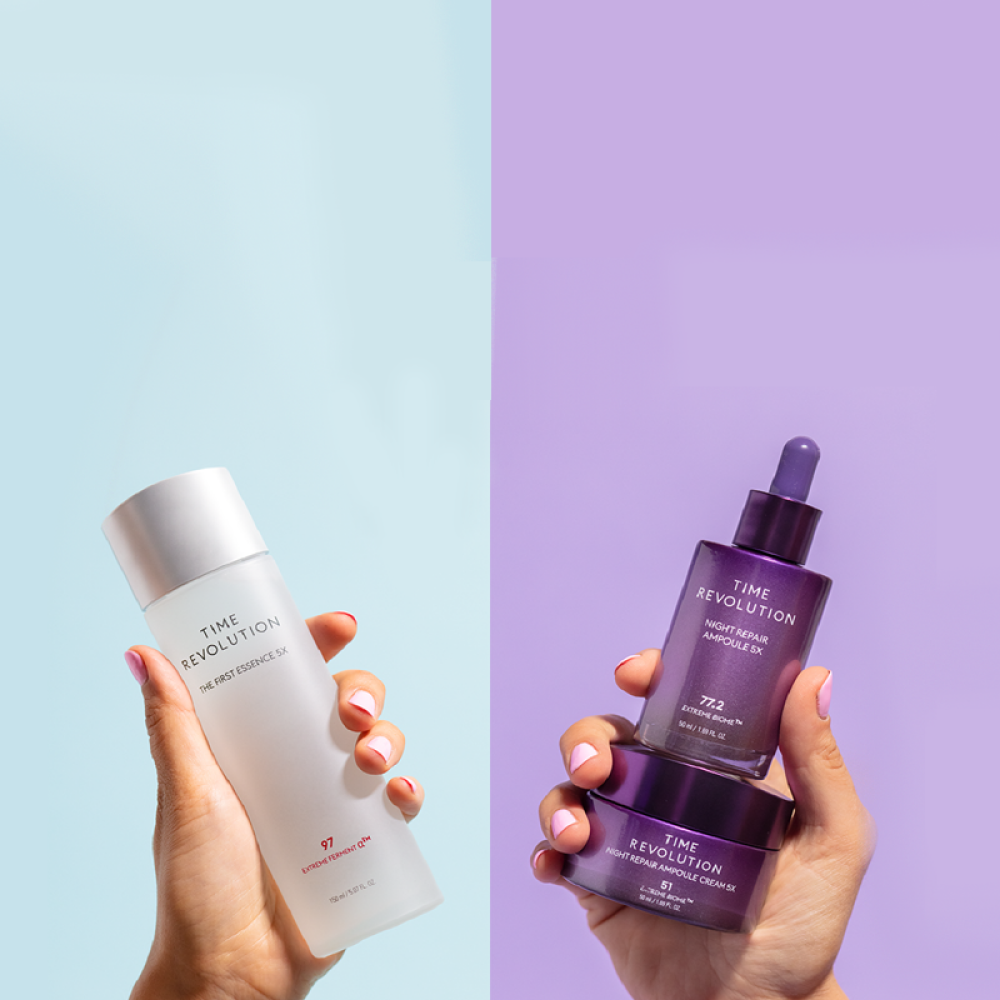In the world of skincare, layering is a common practice, but one question often arises: Should you apply moisturizer or sunscreen first? This debate has sparked discussions among beauty enthusiasts and skincare professionals alike. Understanding the basics of skincare layering, the role of moisturizers, and the importance of sunscreen will help you make an informed decision that suits your skincare needs.
Understanding the Basics of Skincare Layering
Before delving into the moisturizer versus sunscreen debate, it's essential to grasp the concept of skincare layering. Layering involves applying different skincare products in a specific order to maximize their effectiveness and benefits.
Skincare layering is like creating a symphony for your skin. Just as each instrument in an orchestra plays a specific role to produce beautiful music, each skincare product plays a crucial part in enhancing your skin's health and appearance. By layering products correctly, you orchestrate a harmonious blend that nourishes, protects, and revitalizes your skin.
The Importance of Skincare Layering
Skincare layering is vital because it ensures that each product can penetrate the skin and deliver its intended benefits. Applying products in the correct sequence allows them to work synergistically, optimizing their overall effectiveness and enhancing your skin's health and appearance.
Imagine skincare layering as a carefully choreographed dance routine for your skin. Just as each step in a dance contributes to the beauty of the performance, each layer of skincare product enhances the efficacy of the next, resulting in a radiant and healthy complexion. Proper layering not only maximizes the benefits of each product but also creates a strong foundation for your skincare routine.
Key Components in a Skincare Routine
To establish a solid skincare routine, it's important to include key components such as cleanser, toner, serum, moisturizer, and sunscreen. Each product serves a unique purpose and contributes to maintaining your skin's health.
Cleansers act as the foundation of skincare by removing impurities and preparing the skin for subsequent products. Toners help balance the skin's pH levels and tighten pores, creating a smooth canvas for the following steps. Serums deliver potent active ingredients deep into the skin, targeting specific concerns like fine lines or hyperpigmentation. Moisturizers lock in hydration and provide essential nutrients, while sunscreen shields the skin from harmful UV rays, preventing premature aging and damage.
The Role of Moisturizer in Skincare
Moisturizer is a cornerstone of any skincare routine and plays a vital role in maintaining hydrated and healthy skin. It helps to lock in moisture, prevent water loss, and improve the skin's barrier function. In addition to these benefits, using a moisturizer regularly can also help to reduce the appearance of fine lines and wrinkles, as well as soothe any dry or irritated areas on the skin.
Choosing the right moisturizer for your skin type is crucial. For those with oily skin, a lightweight, oil-free moisturizer is recommended to prevent clogged pores. On the other hand, individuals with dry skin may benefit from a richer, more hydrating formula to combat flakiness and tightness.
The Science Behind Moisturizers
Moisturizers work by attracting and trapping moisture in the outer layer of the skin, known as the epidermis. They often contain humectants, emollients, and occlusives, which work together to provide hydration and create a protective barrier. Humectants like hyaluronic acid draw water from the environment into the skin, while emollients such as ceramides help to soften and smooth the skin's texture. Occlusives like petrolatum form a physical barrier to prevent water loss and protect the skin from external aggressors.
How to Properly Apply Moisturizer
When applying moisturizer, it's important to start with a clean face. After cleansing and toning, take a small amount of moisturizer and gently massage it into your skin using upward motions. This helps the product get absorbed and provides a soothing effect. Pay special attention to areas that tend to be drier, such as the cheeks and forehead, and don't forget to extend the application down to your neck and décolletage to keep those areas hydrated as well.
The Importance of Sunscreen in Skincare
Sunscreen is a crucial step in any skincare routine as it helps protect the skin from harmful UV rays. It plays a significant role in preventing premature aging, and sunburns, and reducing the risk of skin cancer.
Applying sunscreen should be a daily habit, even on cloudy days or during the winter months when the sun's rays can still penetrate through the clouds and cause damage to the skin. UV rays can lead to the breakdown of collagen and elastin in the skin, resulting in wrinkles, sagging, and other signs of aging.
Debunking Common Sunscreen Myths
Despite the well-known benefits of sunscreen, there are still misconceptions surrounding its use. One common myth is that people with darker skin tones do not need sunscreen. In reality, everyone, regardless of skin tone, should protect their skin from the sun's harmful rays.
Another myth is that applying sunscreen once a day is enough for all-day protection. In truth, sunscreen should be reapplied every two hours, or more frequently if swimming or sweating, to ensure continuous protection against UV rays.
Choosing the Right Sunscreen for Your Skin Type
Choosing a sunscreen that suits your skin type and preferences is crucial. Look for a broad-spectrum sunscreen with an SPF of 30 or higher. If you have oily skin, opt for a lightweight, non-comedogenic formula, while those with dry skin may benefit from moisturizing sunscreens.
For sensitive skin, mineral sunscreens containing ingredients like zinc oxide or titanium dioxide are gentle and less likely to cause irritation. It's essential to find a sunscreen that you enjoy using to ensure consistency in sun protection as part of your daily skincare routine.
The Great Debate: Moisturizer or Sunscreen First?
Finally, the moment you've been waiting for - should you apply moisturizer or sunscreen first? As with many skincare choices, it depends on your specific needs and preferences.
When it comes to the order of application in your skincare routine, there are a few factors to consider. One important consideration is the type of sunscreen you are using. If you opt for a chemical sunscreen, it is generally recommended to apply it before your moisturizer. This is because chemical sunscreens need to be absorbed into the skin to be effective. On the other hand, if you are using a physical sunscreen (often referred to as mineral sunscreen), which sits on top of the skin to physically block UV rays, you may choose to apply it after your moisturizer.
Pros and Cons of Applying Moisturizer First
Applying moisturizer before sunscreen can provide an added layer of hydration and nourishment to your skin. It also ensures that your skin remains moisturized throughout the day. However, keep in mind that the moisturizer may create a barrier that reduces the effectiveness of the sunscreen.
Moreover, the type of moisturizer you use can also impact the order of application. If you have a thick, occlusive moisturizer that forms a heavy barrier on the skin, applying it before sunscreen may hinder the sunscreen's ability to penetrate the skin and provide adequate protection.
Pros and Cons of Applying Sunscreen First
On the other hand, applying sunscreen first ensures that your skin receives optimal protection from the sun's harmful rays. It forms a protective shield on your skin, shielding it from UV damage. However, some find that applying sunscreen first can leave their skin feeling dry or lacking moisture.
Additionally, if you have specific skin concerns such as acne or hyperpigmentation, the order of application can play a role in addressing these issues. For example, if you are using targeted treatments for acne or dark spots, applying them after sunscreen can ensure that they are able to penetrate the skin without any interference from moisturizers.
Expert Opinions on Skincare Layering
It's always helpful to consider the insights of skincare experts to make an informed decision. Let's dive deeper into what dermatologists and beauty experts have to say about skincare layering.
Dermatologists' Views on Skincare Layering
Dermatologists generally recommend applying sunscreen as the final step in your skincare routine to ensure maximum protection. They suggest using a lightweight moisturizer before sunscreen if your skin requires additional hydration. This is because moisturizers help create a barrier on the skin, preventing moisture loss and providing a smooth canvas for sunscreen application.
Furthermore, dermatologists advise using products with different consistencies in the correct order. For example, it's best to apply lightweight serums or toners before thicker creams to allow better absorption and effectiveness. This layering technique ensures that each product can penetrate the skin and deliver its intended benefits.
Beauty Experts' Take on Skincare Layering
Beauty experts emphasize the importance of tailoring your skincare routine to your individual needs. Experimentation is key to finding the perfect order and combination of products that work best for you. They suggest starting with a cleanser to remove dirt and impurities, followed by a toner to balance the skin's pH level.
After toning, beauty experts recommend applying targeted treatments such as serums or essences to address specific skin concerns like hyperpigmentation or fine lines. These concentrated products contain potent ingredients that can penetrate deeper into the skin and provide targeted benefits.
Finally, beauty experts advise applying a moisturizer to hydrate and nourish the skin, followed by sunscreen to protect against harmful UV rays. This order ensures that the skin is adequately moisturized and shielded from environmental damage.
As you embark on your skincare journey, remember that there is no one-size-fits-all approach. It's essential to listen to your skin's needs and adjust your routine accordingly. Whether you choose to apply moisturizer or sunscreen first, consistency and protection should be your ultimate goals.
With the guidance of dermatologists and beauty experts, you can create a skincare routine that suits your unique needs and addresses your specific concerns. Remember to be patient and give your skin time to adjust to new products or changes in your routine. The key is to find a balance that works for you and helps you achieve healthy, radiant skin.








